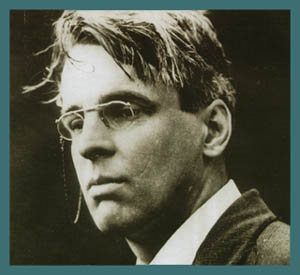Sunday, April 3, 2011
Poetry Review: "Byzantium" by William Butler Yeats
This eerie poem establishes a lot of disturbing imagery within it's five 8-line stanzas. It was written after Yeats' famous poem "Sailing to Byzantium" and seems to be like a sequel to that poem. But the easiest thing to say about "Byzantium" is that if it's a continuation of "Sailing" (and I believe it is), things have gone horribly, horribly wrong. You can read my discussion of "Sailing to Byzantium" HERE.
Here's the text of "Byzantium", and afterwards I'll see if I can do a little analysis/explication of it.
"THE unpurged images of day recede;
The Emperor's drunken soldiery are abed;
Night resonance recedes, night walkers' song
After great cathedral gong;
A starlit or a moonlit dome disdains
All that man is,
All mere complexities,
The fury and the mire of human veins.
Before me floats an image, man or shade,
Shade more than man, more image than a shade;
For Hades' bobbin bound in mummy-cloth
May unwind the winding path;
A mouth that has no moisture and no breath
Breathless mouths may summon;
I hail the superhuman;
I call it death-in-life and life-in-death.
Miracle, bird or golden handiwork,
More miracle than bird or handiwork,
Planted on the star-lit golden bough,
Can like the cocks of Hades crow,
Or, by the moon embittered, scorn aloud
In glory of changeless metal
Common bird or petal
And all complexities of mire or blood.
At midnight on the Emperor's pavement flit
Flames that no faggot feeds, nor steel has lit,
Nor storm disturbs, flames begotten of flame,
Where blood-begotten spirits come
And all complexities of fury leave,
Dying into a dance,
An agony of trance,
An agony of flame that cannot singe a sleeve.
Astraddle on the dolphin's mire and blood,
Spirit after Spirit! The smithies break the flood.
The golden smithies of the Emperor!
Marbles of the dancing floor
Break bitter furies of complexity,
Those images that yet
Fresh images beget,
That dolphin-torn, that gong-tormented sea."
This is pretty much a wildly disorienting poem. If the speaker for the two Byzantium poems is the same, the question is, how did we get from “sages standing in God's holy fire” in the first poem to a courtyard filled with “blood-begotten spirits” in the second? It looks like the speaker reached Byzantium and found it vastly different than he'd imagined. He isn't redeemed from old age; he's transformed into a bodiless observer of the weird happenings in the city. He is passive and entranced by the arcane energy around him.
The speaker isn't having much of an impact on his world and he's not introducing any order to it. There's very little order, period--the Emperor of Byzantium never physically appears, and his agents are less than imposing (“the Emperor's drunken soldiery are abed,” line 2). Who is ruling the roost in this world? The "shade," the“blood-begotten spirits”, or maybe the golden bird in stanza 3?
In "Sailing," the bird was the speaker's ideal self: a beautiful and permanent piece of interactive art that could predict the future. But now the bird is immobile on its perch and shows a disdain, bordering on hatred, for living things, those "complexities of mire and blood". The speaker was once intent on leaving a sensual world filled with reveling youths who ignored the wisdom of senior citizens, but he supposed that he was leaving his young country for an eternal paradise. Though it's true that age and entropy can't intrude upon Byzantium, neither is there any possibility of growth or change.
The most disturbing aspect of this whole poem is the fact that the speaker does not even seem to notice that everything surrounding him is inescapably wrong. From what little information is given, he seems content. But although the speaker doesn't feel his own plight, the reader gets a strong sense that Byzantium is a place where individuals can be trapped by the supernatural and fall into “an agony of trance” until there is no hope and no thought of breaking free.
Or that's my take on it.
Sparknotes has a brief and totally different take on the poem HERE
Have you read it? What do you think about the poem?
Subscribe to:
Post Comments (Atom)


Byzantium... The worst poem I have ever read. Pure Bullshit.... in its poetic form. I think the poet probably was possessed by some ghost or something when he wrote this bullshit. I feel like a occult researcher when reading this bullshit of a poem.
ReplyDeleteYeats is definitely a master craftsman who is well known in the art of understanding the human psyche. Byzantium is not less than a classic in the whole arena of poetry writing in English. Good analysis of the poem, as well. Thanks for the post.
ReplyDeleteCustom Essay Writing Service
Byzantium draws muse from a demonic and unsatisfying imagination. Its complexity is beyond research and its ambiguity is beyond understanding.
ReplyDelete